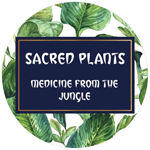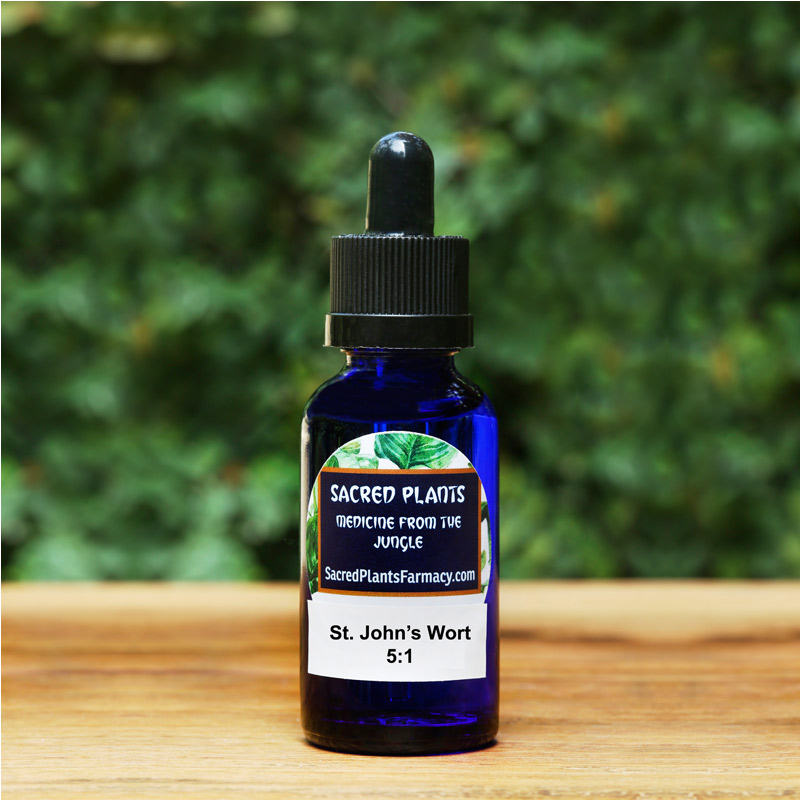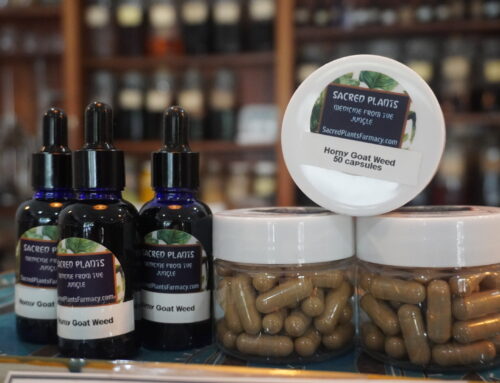Our St. John’s Wort Tincture has a long history of use as sedative for relief of restlessness and nervousness.
- A herb valued for its sedative properties over the centuries
- With an effectiveness confirmed by numerous double blind, placebo-controlled trials
- Excellent for bedwetting in children
- Antiviral properties
Turn to St. John’s Wort Tincture if you’re suffering from anxiety or a nervous condition.
Commonly Known As
- St. John’s wort
- Saint John’s wort
- Hypericum (from the scientific name)
- Goatweed
- Klamath weed
- Tipton weed
People have been using St. John’s wort for centuries. Today, the popular herb is often used to ease the symptoms of depression.
Researchers suspect that ingredients in the herb (hypericin and hyperforin) may increase levels of certain brain chemicals, like serotonin. People with depression often have low levels of serotonin and other neurotransmitters.
One reason people may wish to try the natural remedy for depression (as opposed to antidepressants that can increase serotonin) is that St. John’s wort tends to have fewer side effects than medications.
The herb is also being explored for the following health concerns:
- Anxiety
- Menopause-related symptoms
- Premenstrual syndrome (PMS)
- Seasonal affective disorder (SAD)
- Smoking cessation
An oil made from St. John’s wort has also been used topically for wound healing and a variety of other skin conditions such as eczema and hemorrhoids.
Depression
Although the benefit of St. John’s wort is still being explored, research suggests the herb can be more effective than a placebo in alleviating mild-to-moderate depression.
A 2015 review published in the Annals of Family Medicine examined whether antidepressants were more effective than a placebo for patients being treated for depression by their primary care doctor. The researchers examined 66 previously published studies (with a total of 15,161 participants) and found that both antidepressant medications and St. John’s wort extracts were more effective than a placebo for treating mild to moderate depression.
People taking St. John’s wort were also more likely to continue treatment, as the herb was associated with fewer adverse effects compared to tricyclic and tetracyclic antidepressants, selective serotonin reuptake inhibitors (SSRIs), a noradrenaline reuptake inhibitor (NRI), a serotonin-noradrenaline reuptake inhibitor (SNRI), and noradrenergic and specific serotonergic antidepressant agents (NaSSAs).
Major Depression
The most comprehensive research on St. John’s wort and major depression includes a 2018 report published in the Cochrane Database of Systematic Reviews.
Researchers looked at 29 previously published clinical trials (with a total of 5,489 participants) that compared the effects of St. John’s wort to a placebo or standard antidepressant medication for a period of four to 12 weeks.
The study’s authors found that St. John’s wort extracts may be more effective than a placebo and were as effective as standard antidepressants. Additionally, the herb appeared to have fewer side effects.
The authors noted that the studies conducted in German-speaking countries (where St. John’s wort has a long history of use and is often recommended by physicians) reported more positive results than studies conducted in the United States and other countries.
Possible Side Effects
People taking an oral St. John’s wort supplement for a short period of time may experience side effects. These may include:
- Mild stomach upset
- Diarrhea
- Dry mouth
- Headache
- Tiredness
- Dizziness
- Anxiety
- Restlessness
- Tingling
- Allergic skin reactions
- Sexual or erectile dysfunction
- Vivid dreams
- Liver injury
- Psychosis (rare)
When used topically, St. John’s wort may cause a skin rash. St. John’s wort (both oral or topical) can also increase the sensitivity of your skin and eyes to sunlight. If you have a condition such as lupus or are taking medication that can cause photosensitivity (such as some acne medications), review the risks and benefits of taking St. John’s wort with your doctor or pharmacist.
Possible Drug Interactions
St. John’s wort can cause serious interactions with commonly used medications because of how it gets broken down by the liver. The herb can interact with medication in different ways. It can make some drugs less effective while making the effect of others stronger.
The types of medications that may interact with St. John’s Wort include:
- Antibiotics
- Antidepressants
- Oral contraceptives
- Immunosuppressants
- Blood thinners such as warfarin
- Sedatives and medications used to treat anxiety
- Drugs used to treat cancer, heart conditions, and HIV/AIDS
- Over-the-counter medications (for sleep, coughs, and colds)
St. John’s wort can also interact with other herbs and supplements. You should avoid taking any nutritional supplement or remedy that can raise serotonin, such as 5-hydroxytryptophan (5-HTP), L-tryptophan, or SAMe if you are taking St. John’s wort.
Taking St. John’s wort with antidepressants or any substance that raises serotonin can cause serotonin syndrome, a potentially dangerous condition resulting from an excess of serotonin. Symptoms of serotonin syndrome include confusion, fever, hallucinations, nausea, loss of muscle coordination, sweating, and shakiness.
If you experience any of these symptoms, stop taking St. John’s wort and seek immediate medical attention. Without treatment, the condition can be fatal.
Contraindications
There may be certain situations where it would be unsafe for you to take a supplement such as St. John’s wort or you will need an adjusted dose.
For example, if you are pregnant, breastfeeding, trying to conceive, or taking oral contraceptives (birth control pills), it’s important to talk with your doctor before you start taking St. John’s wort.
St. John’s wort may worsen symptoms in people with certain conditions, including:
- Attention deficit-hyperactivity disorder (ADHD)
- Bipolar disorder (may bring on mania or increase speed of cycling)
- Major depression
- Schizophrenia (may increase the risk of psychosis)
- Alzheimer’s disease
Some research has indicated taking certain herbal supplements, including St. John’s wort, may increase your risk of complications if you are put under anesthesia. You should not take St. John’s wort for two weeks before having surgery.
If you have received an organ transplant, you will need to avoid St. John’s wort as it can interact with the medications given to help prevent transplant rejection.
Dosage and Preparation
There is not enough scientific data to provide a standard recommended dose of St. John’s wort, though there are doses commonly used by researchers who are investigating the herb’s effect on depression.
In NIH-funded trials, participants were given a 300mg dose of a specific concentration of St. John’s wort extract three times a day (900mg daily total). The maximum dose given was 1,800mg per day. By the end of the eight-week trial, the average daily dose was 1,300mg per day.
The appropriate dose of St. John’s wort for you will depend on several factors including your age, biological sex, and medical history. It’s best to work with your doctor, pharmacist, and/or an alternative health practitioner to personalize your dose to ensure effectiveness and safety.
St. John’s wort can be found in several different preparations depending on how it will be used. There are dry, oil, and liquid preparations, including tinctures, capsules, and elixirs.
If you are taking St. John’s wort for depression, you may find taking a daily capsule more effective than using a topical treatment (which may be better suited to treating muscle pain, for instance).
To help maintain its effectiveness, all preparations of the herb should be kept in a cool, dry, place. Active ingredients in St. John’s wort may be affected by light, which is why the supplements are often packaged in a dark-colored container. Make sure to store the bottle or package out of direct sunlight.
St. John’s wort products need to be stored safely, just like any other medication. Unlike prescription and over-the-counter drugs, herbal supplements don’t always come in child-proof containers.
If you or someone you know is living with depression, you may be seeking different options to manage your symptoms. While the research on St. John’s wort is promising, it’s crucial that you work with your healthcare provider and discuss whether it’s appropriate for you, rather than trying it on your own.
Delaying or forgoing treatment for depression can have serious consequences. As you are deciding on treatment, remember to tell each health care provider you work with about all the medications you are taking, including herbal or nutritional supplements, to ensure no potentially dangerous interactions occur.
The statements made within this website have not been evaluated by the Food and Drug Administration. These statements and the products of this company are not intended to diagnose, treat, cure or prevent any disease.






